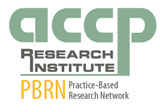
The ACCP RI announces a new partnership to support research combining the use of an individual’s genetic makeup with that of a unique clinical decision support system to help guide medication choices in primary care settings. The new partner, Tabula Rasa HealthCare (TRHC), provides health care organizations with patient-specific, data-driven technology to optimize medication choices to improve patient outcomes, reduce hospitalizations, lower health care costs, and manage risk.
“The movement towards using personal genetic information to inform drug choices is becoming a reality, and many people know that genetic information can be used to guide the choice or dose of a newly prescribed medication,” said Kevin Bain, Pharm.D., MPH, Vice President of Medication Risk Mitigation at TRHC. “It is by combining clinical decision support systems and genetic information that the most accurate prediction of drug response is achieved,” said Veronique Michaud, BPharm, Ph.D., Vice President, Scientific Affairs at TRHC. “TRHC’s medication risk mitigation software offers this type of information at the point of care.”
The new collaborative research program will begin with a pilot study, titled “PharmacoGenomics and Clinical Decision Support Systems for Advancing Patient Care in Depression ( ) Study.” Its purpose is to evaluate the integration of pharmacogenomics testing using a clinical decision support system from a medication risk mitigation tool into the treatment of major depressive disorder in primary care settings. Early in 2017, the ACCP Practice-Based Research Network (PBRN) will enroll clinical pharmacists and their respective primary care practices in this 15-month study.
) Study.” Its purpose is to evaluate the integration of pharmacogenomics testing using a clinical decision support system from a medication risk mitigation tool into the treatment of major depressive disorder in primary care settings. Early in 2017, the ACCP Practice-Based Research Network (PBRN) will enroll clinical pharmacists and their respective primary care practices in this 15-month study.
“Predicting an individual patient’s response to a particular antidepressant is clinically challenging. This implementation pilot will investigate how clinical pharmacists who possess the necessary training and skills to interpret pharmacogenomic results incorporate clinical decision support from a medication risk mitigation tool to make therapeutic recommendations as they assist and collaborate with primary care providers in the drug decision-making process,” said Debra J. Barnette, Pharm.D., FCCP, BCPS, BCACP, CDE, Assistant Professor from Ohio State University and Principal Investigator for the project. “This is an exciting time for pharmacy. Across the country, pharmacists are taking the lead in the area of pharmacogenetic testing. The use of this tool in primary care has the potential to significantly impact patient care.”
The DARTNet Institute, a partner in the effort, will capture data for this study from patient medical records and collect patient-reported outcomes through questionnaires. “DARTNet will provide the ability to use embedded data transfer systems from electronic health records to present detailed patient information to Tabula Rasa HealthCare and back to the treating clinicians—both clinical pharmacists and medical clinicians. DARTNet is excited about working with the ACCP PBRN and Tabula Rasa HealthCare to create a system that will allow other practices to consider this approach to medication prescribing,” said Dr. Wilson Pace, Chief Medical Officer for the DARTNet Institute.
Funding for this pilot study is being provided by Tabula Rasa HealthCare and will include partial use of TRHC’s proprietary medication risk mitigation software, MedWise Advisor®, at participating study sites. The MedWise Advisor Medication Risk Mitigation Platform provides access to clinical pharmacists participating in the study to a clinical decision support tool when conducting comprehensive evaluations of patients’ medications, conditions, and pharmacogenomic testing results to make prescribing recommendations to their physician colleagues. “Personalized health care has been knocking at our door for some time. Development of technological solutions based on scientific knowledge by TRHC will allow the clinical application of a personalized and comprehensive approach towards medication management,” said Jacques Turgeon, BPharm, Ph.D., Chief Scientific Officer at TRHC.
For more information about this study, please contact the ACCP PBRN Director and Study Co-investigator, Rachel Chennault, Ph.D., at [email protected].